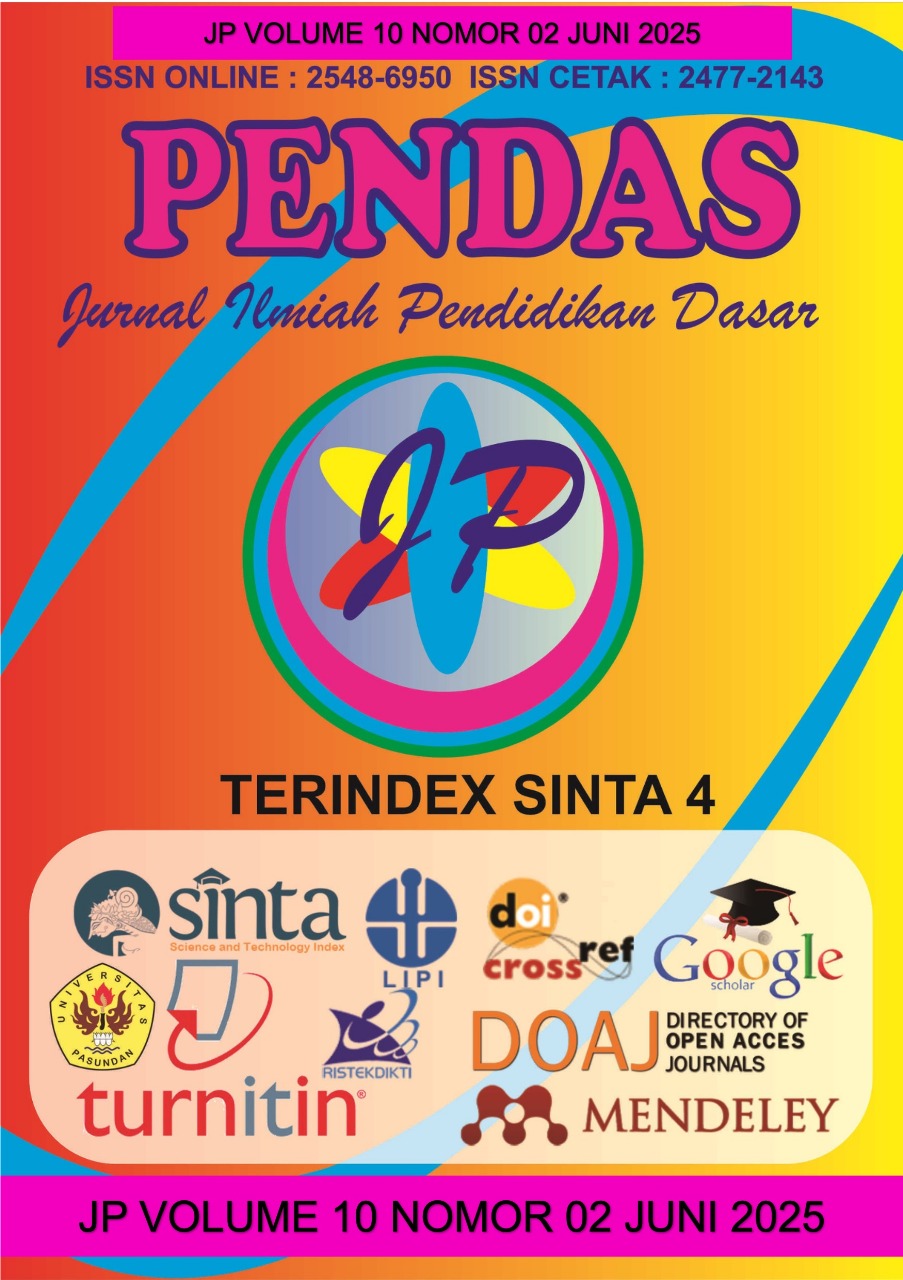PENERAPAN TEORI BELAJAR KOGNITIF DALAM PEMBELAJARAN MATEMATIKA PADA PESERTA DIDIK KELAS 2 SDN 1 GIRIKARTO
DOI:
https://doi.org/10.23969/jp.v10i2.25817Keywords:
class 2, application, cognitive learning theoryAbstract
Cognitive processes refer to thinking activities related to a person's level of intelligence, which are largely influenced by how individuals actively manipulate and interact with their environment. This includes the ability to associate, evaluate, and consider an event or incident. In this study, the author formulates the problem of how to apply cognitive learning theory to grade 2 students of SDN 1 Girikarto. The purpose of this study is to understand the application of cognitive learning theory among these students. This study uses a qualitative descriptive approach involving grade 2 students as research subjects. Data were collected through three main methods: observation, interviews, and documentation. Observation is used as the main method, interviews aim to explore students' understanding of cognitive learning theory, and documentation functions as supporting data. Data analysis is carried out through the stages of data reduction, data presentation, and verification and drawing conclusions. The results of the study indicate that cognitive learning theory has been applied to 25 grade 2 students of SDN 1 Girikarto. Based on these findings, the author recommends that teachers utilize cognitive learning theory as one strategy to improve student learning outcomes. The results of the study indicate that the application of cognitive learning theory can be an effective tool to improve the quality of learning in elementary schools. Therefore, teachers are advised to apply the principles of this theory in the daily learning process.
Downloads
References
Ausubel, D. P. (1968). Educational Psychology: A Cognitive View. New York: Holt, Rinehart and Winston.
Bruner, J. S. (1966). Toward a Theory of Instruction. Cambridge, MA: Harvard University Press.
Budiningsih, Asri. 2015. Belajar dan pembelajaran. Jakarta: PT. Rineka Cipta.
Burhanuddin, Afid . 2018. Kekurangan Dan Kelebihan Teori Kognitif dan Konstruktivistik.
Gagné, R. M. (1985). The Conditions of Learning and Theory of Instruction (4th ed.). New York: Holt, Rinehart and Winston.
Given. K. Barbara. 2014. Brain-Based Teaching. Merancang kegiatan belajar mengajar yang melibatkan Otak, Emosional, Sosial, Kognitif, Kinestetik, dan Reflektif. Kaifa. Bandung
Ibda,Fatimah. 2015. Perkembangan Kognitif: Teori Jean Piaget. INTELEKTUALITA – Volume 3, Nomor 1, Januari-Juni Jauhar. Mohammad. 2011. Implemetasi Paikem. Jakarta:Prestasi Pustaka.
John, Philips L.. 1969. The origins of intellect Piaget's theory. United States of America: Library of Congress.
Muhaimin, dkk. (2012). Psikologi Pendidikan. Bandung: Remaja Rosdakarya.
Muhibbin Syah. (2005). Psikologi Belajar. Jakarta: PT RajaGrafindo Persada.
Pahliwandari, R. (2016). Penerapan Teori Pembelajaran Kognitif dalam Pembelajaran Pendidikan Jasmani dan Kesehatan. Jurnal Pendidikan Olah Raga, 5(2), 154–164.
Piaget, J. (1969). The Psychology of the Child. New York: Basic Books.
Piaget, J. (1972). The Psychology of the Child. New York: Basic Books.
Sugiyono (2013), Metode Penelitian Kombinasi (Mixed Methods) , (Bandung: Alfabeta)
Suharsimi Arikunto (2002), Prosedur Penelitian Suatu Pendekatan Praktek , (Jakarta : PT. Rineka Cipta, , cet ke-12, hlm Muhibbin, Syah. 2005. Psikologi Pendidikan, Suatu Pendekatan Baru. Bandung: PT Remaja Rosdakarya.
Nugroho, Puspo. 2015. Pandangan Kognitifisme Dan Aplikasinya Dalam Pembelajaran Pendidikan Agama Islam Anak Usia Dini. ThufuLA: Jurnal Inovasi Pendidikan Islam Anak Usia Dini. Vol. 3 | No. 2 | Juli-Desember.
Downloads
Published
Issue
Section
License
Copyright (c) 2025 Pendas : Jurnal Ilmiah Pendidikan Dasar

This work is licensed under a Creative Commons Attribution 4.0 International License.














































